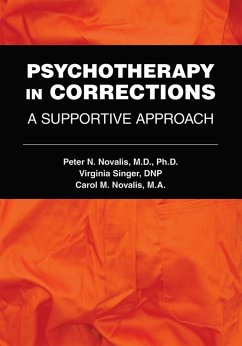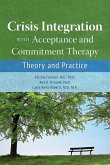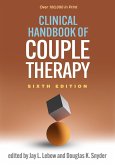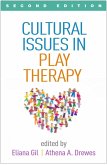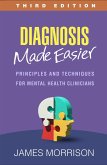Where so many existing books on psychiatry in a prison setting focus on either standards or issues of medication, Psychotherapy in Corrections is unique in its focus on the actual practice of psychotherapy in correctional facilities.
With a particular emphasis on supportive psychotherapy with adult patients, this guide draws on the authors' extensive experience in the field and features case vignettes that serve to bring some of the most important points to life. Organized into four parts, it covers: . The relationship between psychotherapy and corrections; supportive therapy techniques; and issues that affect new or returning prisoners. How to address core issues in helping prisoners, including self-harm and suicidality, trauma and stressor-related disorders, and substance use disorders. Key disorders encountered in correctional settings, including serious mental illness; mood disorders, including bipolar disorder and depression; and personality disorders, including psychopathy. Special considerations, including the experience of women in prison; behaviors and problems that can disrupt care; cultural issues; and preparing prisoners for release
Diagnostically oriented chapters, each of which features key points and provides quick access when referencing specific conditions and scenarios.
Psychotherapy in Corrections also incorporates the latest developments in society wrought by the pandemic and ongoing conversations about social justice, acknowledging the effects that COVID-19 has had on conditions within prisons and the issues that affect therapists practicing in a correctional setting, such as the treatment of the poor, minorities, and traditionally disadvantaged persons.
All those practicing in correctional settings-whether psychiatrists, psychologists, mid-level mental health practitioners, social workers, professional counselors, and others-will benefit from the practical and detailed approach in this comprehensive volume that will equip them to focus on and treat the human before them, irrespective of their crime or the setting.
With a particular emphasis on supportive psychotherapy with adult patients, this guide draws on the authors' extensive experience in the field and features case vignettes that serve to bring some of the most important points to life. Organized into four parts, it covers: . The relationship between psychotherapy and corrections; supportive therapy techniques; and issues that affect new or returning prisoners. How to address core issues in helping prisoners, including self-harm and suicidality, trauma and stressor-related disorders, and substance use disorders. Key disorders encountered in correctional settings, including serious mental illness; mood disorders, including bipolar disorder and depression; and personality disorders, including psychopathy. Special considerations, including the experience of women in prison; behaviors and problems that can disrupt care; cultural issues; and preparing prisoners for release
Diagnostically oriented chapters, each of which features key points and provides quick access when referencing specific conditions and scenarios.
Psychotherapy in Corrections also incorporates the latest developments in society wrought by the pandemic and ongoing conversations about social justice, acknowledging the effects that COVID-19 has had on conditions within prisons and the issues that affect therapists practicing in a correctional setting, such as the treatment of the poor, minorities, and traditionally disadvantaged persons.
All those practicing in correctional settings-whether psychiatrists, psychologists, mid-level mental health practitioners, social workers, professional counselors, and others-will benefit from the practical and detailed approach in this comprehensive volume that will equip them to focus on and treat the human before them, irrespective of their crime or the setting.
Dieser Download kann aus rechtlichen Gründen nur mit Rechnungsadresse in A, D ausgeliefert werden.

